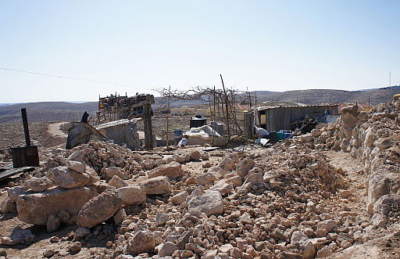Last summer, I had the opportunity, along with 30 other British Jewish students, to visit the Palestinian Village of Umm al Kheir. It was a hard day. We walked around the village in the heat, seeing with our own eyes what it’s like living in a village where someone’s home could be demolished. The Bedouin people of Umm al Kheir only reiterated what we could already see. They told us that the threat – and reality – of demolitions is dehumanizing and completely immoral. What’s worse, there’s a neighboring settlement quite literally a stone’s throw away, as the village can testify. Despite the fact that the settlement was built without permits, the residents of Carmel live with secure shelters and military protection. The disparity was blindingly obvious and quite shocking to the group.
As both a Jew and a Zionist, this was deeply troubling to me.
As Jews in the diaspora, this absolutely matters to us.
Whichever way you look at the current situation in Israel and the Palestinian territories, it can’t be disputed that the Israeli government is responsible for the demolitions. According to civil administration, 98.5 percent of building permits in Area C were rejected between 2000 and 2014, often for arbitrary reasons. With the Palestinian population growing, this is completely unsustainable and means many will lack the shelter and security they need. We spent the day in makeshift classrooms and tents where the village ate, learned, and lived together. They were so welcoming and hospitable despite things falling apart around us, knowing even that community center could be torn down.
Seeing and feeling the effect of the demolitions was intensely uncomfortable for me as a Jew. My understanding of Judaism, stemming from my involvement with the youth movement RSY-Netzer (the Reform Zionist movement in the UK), is that justice is absolutely imperative. Therefore, I wish to see the Israeli government reflect Jewish values.
I’m not alone – 71 percent of British Jews support a two-state solution. However, our communal organizations do not reflect this. The Board of Deputies of British Jews claims to be the representative voice of anglo Jewry, and Yachad – the pro-Israel, pro-peace movement that we are part of – has been a member since 2015. Yet their leadership are reluctant to meet with us. We need to change the discourse surrounding the Israeli-Palestinian conflict to include and embrace criticism, not only on the destructive actions of Palestinian leadership but Israel’s leadership too.
This is why we need this campaign. It is so easy as diaspora Jews to go to Israel and disengage with the conflict. A week before the trip that took me to Umm al Kheir, I was completely oblivious to what was truly going on just a few miles away, hanging out on a Tel Aviv beach, swimming and eating a lot of shakshuka. The Occupation felt very far away. However, whether we are in Israel proper, the UK, or the US, it truly is not. We need to wake up our Jewish communities and hold Israel accountable for its actions.
As young people active in synagogues, youth movements, and universities, we are the generation who can really affect change. The demolitions are a blatant obstacle in the way of peace. By not settling for the status quo, not only do we improve the quality of life for Palestinians living in Area C but we also are taking a step towards a just and lasting peace for both Israelis and Palestinians. So please let’s stand together as young diaspora Jews and say that we will not settle for this.
Hannah Radley, 21, is a student at the University of York and a bogeret of RSY Netzer. She went on the Yachad Student Trip and is part of the #DontSettleForThis campaign group with Yachad Youth.
![Umm_al-Kheir.1 "The Bedouin people of Umm al Kheir only reiterated what we could already see." | [Public Domain], via Wikimedia Commons](https://newvoices.org/wp-content/uploads/2018/03/Umm_al-Kheir.1.jpg)

